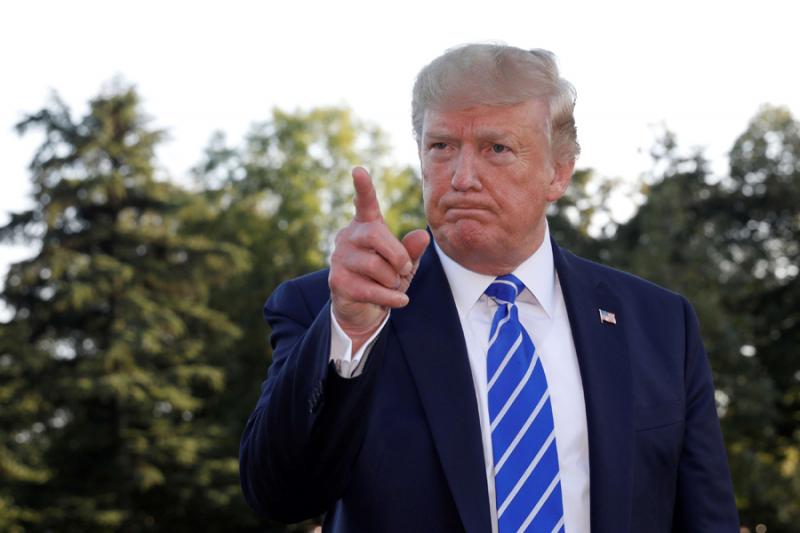For now, Trump-Iran talks are about talking

US President Donald Trump speaks with reporters on the South Lawn of the White House in Washington, August 30. (Reuters)
Chances are the Iranians won’t be as wily — and as smart — as North Korea, which has strung Trump along through three meetings and lots of “beautiful” letters from Kim but no change of behaviour.
In September 2017, US President Donald Trump was vowing the “total destruction” of North Korea. Eight months later, he was shaking hands with North Korean leader Kim Jong-un and discerning great economic “potential” in the dictator’s isolated, impoverished country.
In May 2019, Trump was tweeting about “the official end of Iran.” Then, as the G7 summit in France closed August 26, he spoke of Iran’s “tremendous potential” and the possibility of meeting with Iranian President Hassan Rohani.
With apparent friendliness, more extreme than he initially extended to North Korea, Trump even spoke of a “Make Iran Rich Again” programme. “MIRA” has the ring of #MAGA, the “Make America Great Again” slogan that animated Trump’s 2016 presidential election campaign. In a sense, this erratic US president appeared to be elevating Iran to a level he hasn’t North Korea.
It’s stuff and nonsense. This is reality television in the biggest, most consequential “Big Brother” house possible but it’s not certain the Iran-US series of the Trump Show will come to pass.
Any comparisons between Trump’s overtures to North Korea and Iran were always superficial. In the days since Trump’s offer of talks, Tehran has, at least overtly, been less obliging than Pyongyang about providing Trump with a short-lived diplomatic triumph.
It wouldn’t involve much, just, say, a photo op but Rohani has demanded that all sanctions be lifted before any meeting can take place. Iranian Foreign Minister Mohammad Javad Zarif dismissed the prospect of a meeting as “unimaginable.”
Chances are the Iranians won’t be as wily — and as smart — as North Korea, which has strung Trump along through three meetings and lots of “beautiful” letters from Kim but no change of behaviour. Is this because the Iranians are especially wise or remarkably foolish?
Neither. The political reality is that Iran is no North Korea. It doesn’t have nuclear weapons, which means Trump can be a tad more dismissive, a point the Iranians recognise and probably rue. It has regular elections, even if circumscribed by the ruling clerics. Rohani cannot make do with a photo op; he must be responsive to public opinion, especially with parliamentary elections in February.
This is a complication but it is partly of Trump’s making. His 2018 unilateral withdrawal from the nuclear deal and “maximum pressure” campaign on Iran emboldened regime hardliners and weakened the pragmatic Rohani, who pushed the accord in his first term.
The fulminations of Hossein Shariatmadari, editor of the Kayhan state-run newspaper, viewed as the hardliners’ mouthpiece, are a good indication of the hostility aroused by Trump’s blithe offer of talks with Rohani. Shariatmadari said any such meeting would be “madness.”
Funnily, Trump’s conciliatory gestures towards Iran illustrate just how different it is from North Korea. Trump previously called Iran a “corrupt dictatorship” but, unlike Kim, Rohani doesn’t have the powers of a dictator. He doesn’t have carte blanche to engage in talks with the country Iran calls the “Great Satan.”
It is Iranian Supreme Leader Ayatollah Ali Khamenei who has the final say. He too, unlike Kim, will eventually give way to a successor, chosen by clerics elected to the Iranian Assembly of Experts. Khamenei has ruled out negotiations with the United States as “double poison,” which dampens Trump’s desire for an easy and eye-catching moment for the history books.
If it happened, it would be an even bigger triumph than the first Trump-North Korea photo op. In June 2018, Trump became the first sitting US president to meet with the leader of North Korea. To meet the Iranian president would top that. After all, the cry of “Death to America!” doesn’t ring out in Pyongyang, as it has in Tehran every Friday since the Islamic revolution of 1979 and former US President Barack Obama, on whose watch the 2015 Iran nuclear deal was negotiated, only ever spoke to the Iranian leader on the phone.
That Trump is eager to be the great dealmaker with Iran is painfully clear. That he will have to tread carefully, so as not to anger Middle Eastern allies as well as sections of his own stridently anti-Iran Republican Party, is also abundantly clear. That Iran is unlikely to play nice, quickly and easily like North Korea, is crystal clear.
At this point, talking about talking about talks may be the safest way forward for everyone concerned.
Originally published in The Arab Weekly

